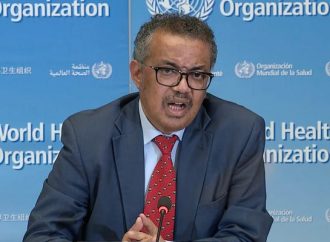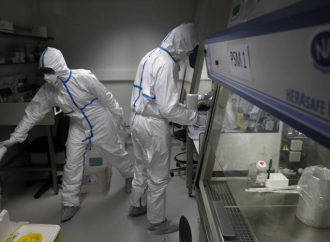This Social Good App Wants To Make It Simple (And Fun) To Impact The World Everyday
- NEWS
- June 26, 2020

President Donald Trump announced this week that he plans to halt US funding for the World Health Organization.
During a White House press conference on Tuesday, Trump blamed the WHO for “severely mismanaging and covering up the spread of the coronavirus,” and said the US would end its annual contribution — which was $418 million in 2018 — to the organization.
The allegations stem from recent reports that show China has not been wholly truthful about its number of cases and deaths, and that officials there hid the fact that the virus could spread person-to-person for six days.
But the World Health Organization used information that Chinese officials relayed to it to inform public-health policy recommendations.
“The WHO willingly took China’s assurances to face value, and they took it just at face value and defended the actions of the Chinese government, even praising China for its so-called transparency,” Trump said on Tuesday.
Conflicting information about the beginning of the outbreak
Authorities in Wuhan first informed the WHO about 41 cases of an unknown, pneumonialike illness on December 31. They said the infections appeared to be linked to a local wet market. The WHO set up an incident management team to deal with the outbreak the following day.
Recent studies, however, have revealed that those late-December cases were not the first in Wuhan.
A woman walks in front of the closed Huanan wholesale seafood market, where health authorities say a man who died from a respiratory illness had purchased goods from, in the city of Wuhan, Hubei province, on January 12, 2020. – A 61-year-old man has become the first person to die in China from a respiratory illness believed caused by a new virus from the same family as SARS, which claimed hundreds of lives more than a decade ago, authorities said. NOEL CELIS/AFP via Getty Images
A study published last week suggested that the coronavirus was spreading in the local community by early January, and research in The Lancet showed that the first person to test positive for the coronavirus was likely exposed to it on December 1, then showed symptoms on December 8.
Such findings don’t align with China’s official narrative, but it’s not yet clear when Chinese officials actually first realized a new disease was spreading.
The WHO has praised China’s outbreak response
World Health Organization Director General Tedros Adhanom Ghebreyesus during a virtual news briefing on COVID-19 from WHO headquarters in Geneva on April 6, 2020. AFP via Getty Images
On April 7, before announcing he’d cut WHO funding, Trump accused the organization of being “very China-centric.”
The WHO doesn’t have much to gain financially by aligning with China more than other countries — China’s annual contribution is $40 million, less than 1% of the organization’s annual budget. But the WHO has nonetheless applauded China’s response to the coronavirus.
WHO Director-General Tedros Adhanom Ghebreyesus said on January 29 that China’s actions, like locking down Wuhan, “helped prevent the spread of coronavirus to other countries.” And a WHO envoy sent to China in February reported that the rest of the world was “not ready” to fight COVID-19 the way China did.
This praise might have to do with the marked difference between China’s response to COVID-19 and the strategy it pursued during SARS coronavirus outbreak in 2002. The Chinese government didn’t inform the WHO about SARS until February 14, 2003 — 88 days after the first reported case. According to The Sydney Morning Herald, doctors in Beijing were ordered by authorities to hide SARS patients from WHO officials during inspections.
The WHO could have been more skeptical about Chinese data
Michael Ryan, the executive director of the WHO’s health emergencies program, said on January 29 that the organization had “seen no obvious lack of transparency” from China. Trump also tweeted praise for China’s transparency in late January.
But recently, experts have raised concerns about the accuracy of China’s reported numbers of cases and deaths — especially during the first stages of the outbreak — as well as about when Chinese officials realized the virus could jump between people.
A memo between top Chinese officials, obtained by The Associated Press, revealed that Chinese officials knew people could transmit the coronavirus to each other by January 14, but didn’t tell the world (or the WHO) until January 20.
In those six intervening days, China publicly said there was no evidence of human-to-human transmission. The WHO relied on that information to direct policy and advise other countries, tweeting that “preliminary investigations conducted by the Chinese authorities have found no clear evidence of human-to-human transmission.”
A worker collects a test swab from a construction worker in Wuhan, China, April 7, 2020. China Daily via Reuters
Although China kept this information from the WHO as much as it did from the rest of the world, Jamie Metzl, a WHO expert and former member of the US National Security Council, said the organization could have been quicker to call out China’s shortcomings.
The WHO “could have done an earlier and better job of highlighting China’s failure to permit access to WHO experts and share critical information and of sounding the alarm,” he said in a statement shared with Business Insider.
Cutting funding to the WHO undermines the pandemic response
The US is by far the largest funder of the WHO — its 2018 contribution was equal to about 9.5% of the agency’s budget for the 2018-19 year. Of the 41 member states that voluntarily contribute annual funds, the US gives the most by a factor of nearly four.
“Like many other organizations and states, the WHO made mistakes during this crisis that must all be reviewed carefully, thoughtfully, and urgently,” Metzl said. But, he added, “cutting off US funding to the World Health Organization in the middle of the worst pandemic in a century is the height of self-defeating lunacy.”
Pallets of surgical gowns are unloaded from an international cargo plane in Miami, Florida, on March 31, 2020. Reuters
Jack Chow, a former WHO assistant director-general, previously told Business Insider that cutting WHO funding would be a “profound mistake.”
He said such defunding could mean “the pandemic could last for many more months, even years, longer, and could even become permanent among human populations.”
Something is loading.

The institute received a first grant of $4.9 million to invest in pre-clinical research on its own vaccine candidate. Frédéric Tangy, head of the vaccine creation laboratory, indicates that 60 percent to 70 percent of the population has to be immunized to contain the virus. Tangy forecasts that the institute can start trials with its
READ MORE
If you’re reading this, you’ve already made the courageous step into awareness. You may have heard that the key to serenity is tied to how quickly you’re able to cycle through awareness, acceptance and, finally, action. When it comes to calculating your own ethical or sustainable footprint in the world, it can be understandably overwhelming.
READ MORE